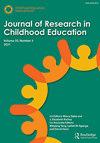新冠肺炎大流行期间的家庭学习环境:护理人员和儿童的认知
IF 1.3
Q2 EDUCATION & EDUCATIONAL RESEARCH
引用次数: 0
摘要
摘要在本研究中,我们探讨了新冠肺炎大流行期间学龄前至三年级儿童的家庭学习环境以及照顾者对家庭学习的看法、策略和态度。参与者包括10名看护人及其学龄前至三年级的儿童。数据是通过护理人员和儿童访谈以及2020年夏季的护理人员调查收集的。描述性统计、开放式、轴向和选择性编码用于分析研究数据。研究结果表明,照顾者为儿童的学习提供学术支持,监督儿童出于学术目的使用技术,并创建研究区域。孩子们的学习活动主要是数学和语言艺术。新冠肺炎期间,孩子们完成家庭作业,并与照顾者和兄弟姐妹一起参加活动。孩子们报告说,他们想念学校、朋友、老师和学校活动。研究结果从照顾者和儿童的角度加深了我们对新冠肺炎大流行期间家庭学习环境的有限理解,并阐明了在照顾者和技术使用的帮助下改善儿童在家学习的可能途径。本文章由计算机程序翻译,如有差异,请以英文原文为准。
Home Learning Environments During the COVID-19 Pandemic: Caregivers’ and Children’s Perceptions
ABSTRACT In this study, we explored Pre-K through 3rd-grade children’s home learning environments and caregivers’ perceptions, strategies, and attitudes regarding home learning during the COVID-19 pandemic. Participants included 10 caregivers and their Pre-K through 3rd-grade children. Data were collected via caregiver and child interviews, and a caregiver survey in Summer 2020. Descriptive statistics, and open, axial, and selective coding were used to analyze research data. Findings indicated that caregivers provided academic support for children’s learning, supervised their children’s technology use for academic purposes, and created study areas. Children’s learning activities were mainly in mathematics and language arts. During COVID-19, children completed homework and participated in activities with caregivers and siblings. Children reported missing their schools, friends, teachers, and school activities. Findings deepened our limited understanding of the home learning environment during the COVID-19 pandemic from caregivers’ and children’s perspectives and illuminated possible pathways to improve children’s learning at home with the assistance of caregivers and technology use.
求助全文
通过发布文献求助,成功后即可免费获取论文全文。
去求助
来源期刊

Journal of Research in Childhood Education
EDUCATION & EDUCATIONAL RESEARCH-
CiteScore
3.10
自引率
0.00%
发文量
27
期刊介绍:
The Journal of Research in Childhood Education, a publication of the Association for Childhood Education International, features articles that advance knowledge and theory of the education of children, infancy through early adolescence. Consideration is given to reports of empirical research, theoretical articles, ethnographic and case studies, participant observation studies, and studies deriving data collected from naturalistic settings. Cross-cultural studies and those addressing international concerns are welcome.
 求助内容:
求助内容: 应助结果提醒方式:
应助结果提醒方式:


